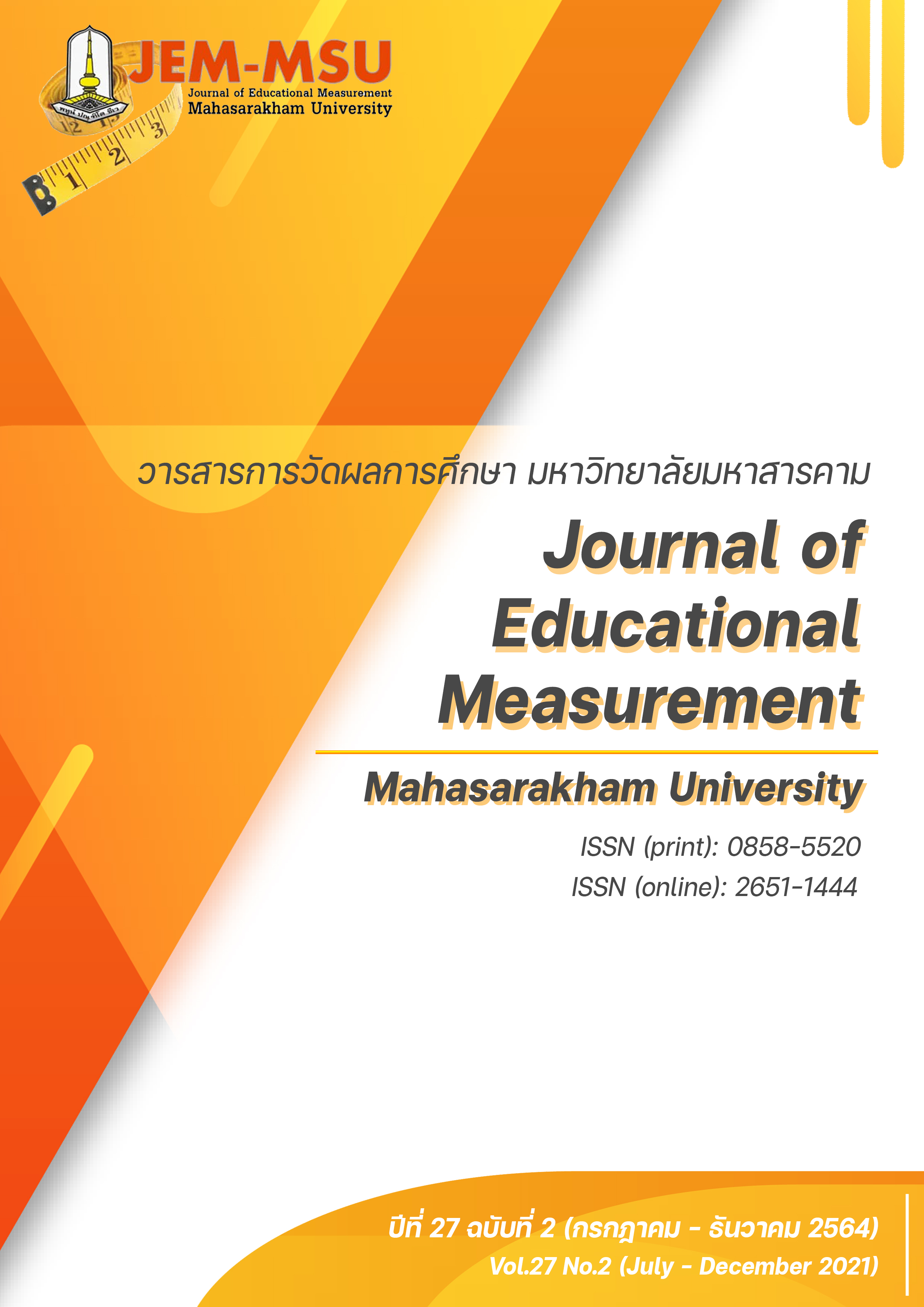An Analysis of Multidimensional Construct with Multidimensional Pairwise Preference Format
Main Article Content
Abstract
The Multidimensional Pairwise Preference (MDPP) format is a sub-format of the forced choice format. Its important property is to present respondents with two statements similar in social desirability (SD) but different in dimension. There are now research-based recommendations for constructing MDPP measures in order to score with MUPP IRT Model efficiently. Construction of MDPP measures is divided into 3 phases. Phase 1 deals with developing many statements representing different personality dimensions, administering the statements to a group of judges instructed to evaluate each statement, administering the statements to a group of participants instructed to rate themselves, estimating item parameters for the individual statement, collecting and storing the statements into an item bank. Phase 2 deals with developing measures by pairing statements similar in desirability but representing different dimensions. Phase 3 deals with analyzing the scores of the respondents.
Article Details
The content and information contained in the published article in the Journal of Educational Measurement Mahasarakham University represent the opinions and responsibilities of the authors directly. The editorial board of the journal is not necessarily in agreement with or responsible for any of the content.
The articles, data, content, images, etc. that have been published in the Journal of Educational Measurement Mahasarakham University are copyrighted by the journal. If any individual or organization wishes to reproduce or perform any actions involving the entirety or any part of the content, they must obtain written permission from the Journal of Educational Measurement Mahasarakham University.
References
Brown, A. & Olivares, A. M. (2011). Item Response Modeling of forced-choice questionnaires. Educational and Psychological Measurement, 71(3), 460-502.
Brown, A. (2015). Personality Assessment, Forced-choice. International Encyclopedia of the Social and Behavioral Sciences (2nd Ed.). Netherlands: Elsevier.
Cao, M. (2016). Examining the fakability of forced-choice individual differences measures. Doctoral dissertation in Psychology University of Illinois at Urbana-Champaign.
Huber, C. (2017). Faking and the Validity of Personality Tests: Using New Faking-Resistant Measures to Study Some Old Questions. Ph.D. Dissertation in Philosophy University of Minnesota.
Lee, P., Joo, S. H. & Lee, S. (2019). Examining stability of personality profile solutions between Likert-type and multidimensional forced choice measure. Personality and Individual Differences, 142(7), 13-20.
McCloy, R., Heggestad, E. & Reeve, C. (2005). A Silk Purse from the Sow's Ear: Retrieving Normative Information from Multidimensional Forced-Choice Items. Organizational Research Methods, 8(2), 222-248.
Oswald, F. L., Shaw, A. & Farmer, W. L. (2015). Comparing Simple Scoring with IRT Scoring of Personality Measures: The Navy Computer Adaptive Personality Scales. Applied psychological measurement, 39(2), 144–154.
Stark, S., Chernyshenko, O. & Drasgow, F. (2005). An IRT approach to constructing and scoring pairwise preference items involving stimuli on different dimensions: An application to the problem of faking in personality assessment. Applied Psychological Measurement, 29(3), 184- 201.
Stark, S., Chernyshenko, O. S., Drasgow, F. & Williams, B. A. (2006). Examining assumptions about item responding in personality assessment: Should ideal point methods be considered for scale development and scoring?. Journal of Applied Psychology, 91(1), 25–39.
Stark, S., Chernyshenko, O., Drasgow, F. & White, L. (2012). Adaptive Testing with Multidimensional Pairwise Preference Items: Improving the efficiency of personality and other noncognitive assessment. Organizational Research Methods, 15(3), 463-487.
Stark, S., Chernyshenko, O., Drasgow, F., Nye, C., White, L., Heffner, T. & Farmer, W. (2014). From ABLE to TAPAS: A New Generation of Personality Tests to Support Military Selection and Classification Decisions. Military Psychology, 26(3), 153-164.
Tay, L., Drasgow, F., Rounds, J. & Williams, B. A. (2009). Fitting measurement models to vocational interest data: Are dominance models ideal?. Journal of Applied Psychology, 94(5), 1287–1304.
Tay, L., Ali, U. S., Drasgow, F. & Williams, B. (2011). Fitting IRT models to dichotomous and polytomous data: Assessing the relative model–data fit of ideal point and dominance models. Applied Psychological Measurement, 35(4), 280-295.
Usami, S., Sakamoto, A., Naito, J. & Abe, Y. (2016). Developing Pairwise Preference-Based Personality Test and Experimental Investigation of Its Resistance to Faking Effect by item response model. International Journal of testing, 16(4), 288-309.
Wang, W., Qiu, X., Chen, C., Ro, S. & Jin, K. (2017). Item Response Theory Models for Ipsative Tests With Multidimensional Pairwise Comparison Items. Applied Psychological Measurement. 41(8). 600-613.


